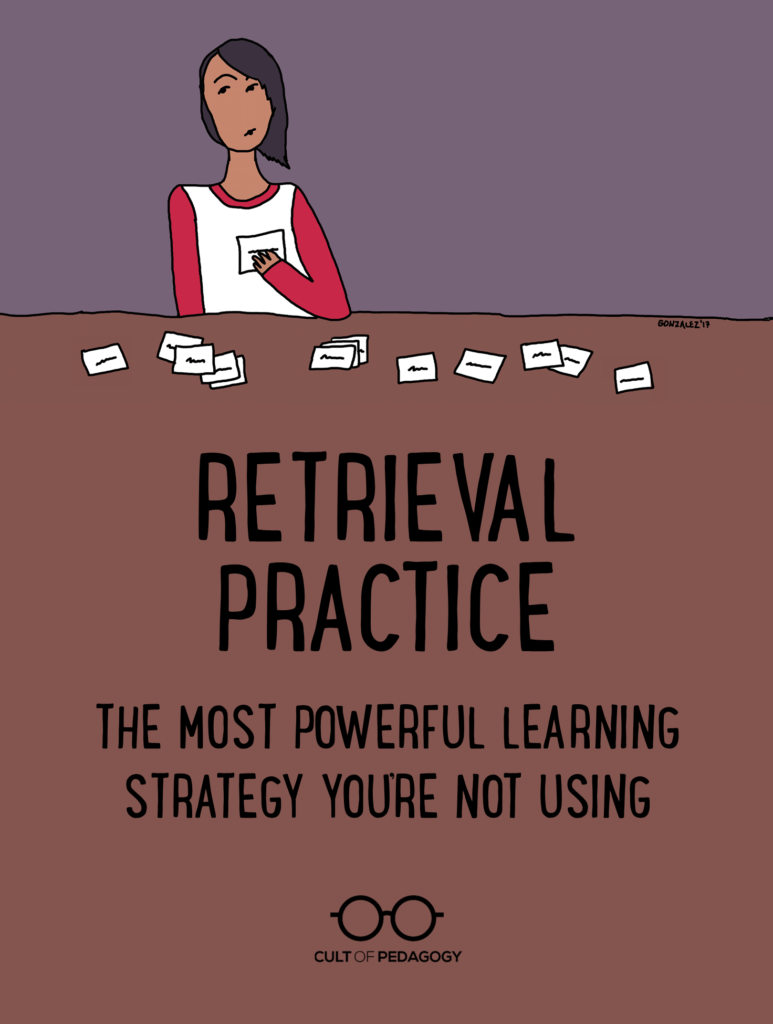
Listen to my interview with Pooja Agarwal (transcript):
Sponsored by Raymond Geddes and Kids Discover
We’ve talked about retrieval practice two other times on this site: First in 2015, when we read the book Make it Stick. Then in 2016, I interviewed cognitive psychologists Megan Smith and Yana Weinstein about the Six Powerful Learning Strategies You Must Share with Students.
In both cases, I noticed that although we were discussing collections of techniques, retrieval practice was at the core of both groups. Because it’s such a powerful technique, I would think that by now it would have really taken off, that I’d hear teachers talking about it and see the term crop up in lots of education spaces, but I don’t see that happening.
So I wanted to give it one more push by carving out a designated spot for it here. My goal is to help retrieval practice become a regular part of classroom practice and part of our common vocabulary as teachers. To help with this cause, I interviewed Pooja Agarwal, Ph.D., cognitive scientist and founder of RetrievalPractice.org.

Dr. Pooja Agarwal
What is Retrieval Practice?
Retrieval practice is the act of trying to recall information without having it in front of you. Suppose you’re studying the systems of the human body—skeletal, muscular, circulatory, and so on. You could do retrieval practice by attempting to name those systems without looking at the list. Once you’ve listed all you can remember, you’d open up your book or notes and check to see if you got them right.
You might be thinking, This is nothing new. The whole concept of flashcards is built on retrieval practice, and flashcards have been around forever, right?
What’s new is the research: In recent years, cognitive psychologists have been comparing retrieval practice with other methods of studying—strategies like review lectures, study guides, and re-reading texts. And what they’re finding is that nothing cements long-term learning as powerfully as retrieval practice.
The Research
Agarwal and her colleagues studied the effects of retrieval practice with students in a middle school social studies course (McDaniel, Agarwal, Huelser, McDermott, & Roediger, 2011). Over the course of a year and a half, while the teacher continued teaching as normal, students were regularly quizzed on the material with no-stakes quizzes, meaning they wouldn’t count against their grades. These quizzes only covered about one-third of what was being taught. The teacher left the room for every quiz, so she had no knowledge of what was included in the quizzes.
On end-of-unit exams, students scored a full grade level higher on the material from the quizzes than on any of the other material. The other concepts had been taught and reviewed by the teacher as they normally would; the only difference was that some things also appeared on the no-stakes quizzes, and those were the concepts students retained more fully when tested on the exam.
The very act of being quizzed actually helped students learn better.
Here’s what this means for teachers: When we teach something once, then want to do something else to help students learn it better, instead of just reviewing the content, we’re much better off giving something like a quiz instead. In other words, if we do more asking students to pull concepts out of their brains, rather than continually trying to put concepts in, students will actually learn those concepts better.
To read about other studies on retrieval practice, click here. For now, let’s look at some ways you can incorporate retrieval practice into your instruction.
Ways to Use Retrieval Practice in the Classroom
Think-Pair-Share
This quick, low-maintenance strategy can be used at any time to have students recall information, then share it with a partner. You can use think-pair-shares with single-answer questions, or make them more open-ended, like “Think of one thing you learned yesterday about cells.” Be sure to have students think on their own before turning to a partner. “It’s important for students to retrieve individually as much as possible,” Agarwal advises. “If you jump right into pairs, then we all know as educators that some students are retrieving and some may not be.” One way to make sure all students retrieve is to have them jot responses down on paper before sharing them with a partner.
Low-Stakes Quizzes
These can be given on paper, in a Google Form, with an individual response system like clickers, Plickers, or Poll Everywhere; or by using a game like Kahoot or Quizziz. It’s important to note that these quizzes are a learning strategy: Ideally, students wouldn’t get scores on them at all, but if you must give some points, make them an almost negligible part of students’ overall class grade.
Brain Dumps
Have students get out a sheet of paper and, within a certain length of time, write down everything they know about a topic of study. This can be done at the beginning of a unit (similar to how you’d use a K-W-L Chart), partway through as a way to reinforce learning, or near the end of a unit. Once students have completed theirs, they can exchange them in a think-pair-share or use them to compile a whole-class brain dump. Then they can return to their texts to see what they missed or what needs correction.
Flashcards
These can be a powerful retrieval tool in class or at home, but students need to be taught to use them correctly:
- Once a card has been mastered, keep it in the deck a while.
Research has shown that students tend to “drop” cards out of their decks too soon after they have mastered them (Karpicke, 2009). Ideally, a fact should be successfully retrieved three times before a student moves on from it. - Actually retrieve.
Karpicke’s research also found that when students see a familiar prompt on a flashcard, they have a tendency to tell themselves they know it, then flip it over to see the answer, rather than taking a few extra seconds to actually recall the answer—and ideally, say it out loud—before flipping the card over. The difference in timing is subtle, but important: Students will not get the same benefits from flashcards unless they actually retrieve the answer before seeing it. - Shuffle the deck.
Keeping the cards in the same order makes them predictable. Once a deck has been gone through a few times, it should be shuffled to make it more challenging. - For more tips, take a look at College Info Geek’s excellent post on effectively using flashcards.
Tips and Cautions
Retrieval practice is not the same thing as assessment.
Although some retrieval activities might allow you to formatively assess student understanding, remember that retrieval practice is a learning activity. Again, if you must assign points for practices, make sure they will have a very low impact on student grades.
Space your practice.
Retrieval practice is even more effective if it’s done in short bursts over time, rather than in a single long session. This spacing causes students to forget some of the material, and the struggle involved in trying to recall it strengthens their long-term learning.
Include feedback.
If students retrieve the wrong information, the practice won’t be much good unless they find out the right information, so be sure to give them feedback as they go. This can be as simple as providing the correct answer or letting students check their texts after they have attempted to retrieve. “Part of that isn’t just so students know if they got their answer correct or incorrect,” Agarwal says, “but it adjusts students’ metacognition,” helping them get “better at estimating or judging what they know and what they don’t know.”
Match your practice to your assessment.
If your summative assessment for a chunk of content will be basic recall of facts, then the retrieval practice can be that simple. But it you’re going to include some higher-order questions as well, then be sure to ask those same types of questions in retrieval practice.
Does it Fit with Inquiry Learning?
If your classroom is built around more hands-on, inquiry-driven approaches to learning that don’t prioritize retaining specific content—structures like Genius Hour and project-based learning—you might wonder whether retrieval practice is relevant to your teaching.
Consider this: Within any of those frameworks, students still have to learn and retain discrete information. Take, for example, a student who has decided to learn Arabic as his focus for Genius Hour, or students who are studying soil pH as part of a gardening project. Both students will need to study and remember concrete information in order to make progress, so even if your instruction isn’t set up in a traditional way, understanding how retrieval practice works can help you help your students learn better.
A Little Goes a Long Way
Agarwal’s final piece of advice is to start small. “If a student just writes down two things or one thing they learned, and then you move on, that’s okay,” she says. “You’ll still get benefits of retrieval without spending five minutes in a classroom discussion.”
It can be a bell-ringer. An exit slip. A sponge activity. Something you do while students stand in line for lunch. Don’t overthink it. Agarwal advises teachers to ask themselves this: “What is one way we can flip from reviewing information to students retrieving information? What can we do tomorrow?”
What will you do tomorrow? ♦
Learn More
Dr. Agarwal and her colleagues have put together this comprehensive guide to using retrieval practice. Visit RetrievalPractice.org/download to get a free copy for yourself. And be sure to follow Retrieval Practice on Twitter at @RetrieveLearn.
References:
Karpicke, J. D. (2009). Metacognitive control and strategy selection: deciding to practice retrieval during learning. Journal of Experimental Psychology: General, 138(4), 469.
McDaniel, M. A., Agarwal, P. K., Huelser, B. J., McDermott, K. B., & Roediger III, H. L. (2011). Test-enhanced learning in a middle school science classroom: The effects of quiz frequency and placement. Journal of Educational Psychology, 103(2), 399.
Join my mailing list and get weekly tips, tools, and inspiration—in quick, bite-sized packages—all geared toward making your teaching more effective and fun. You’ll get access to our members-only library of free downloads, including 20 Ways to Cut Your Grading Time in Half the e-booklet that has helped thousands of teachers save time on grading. Come on in!!

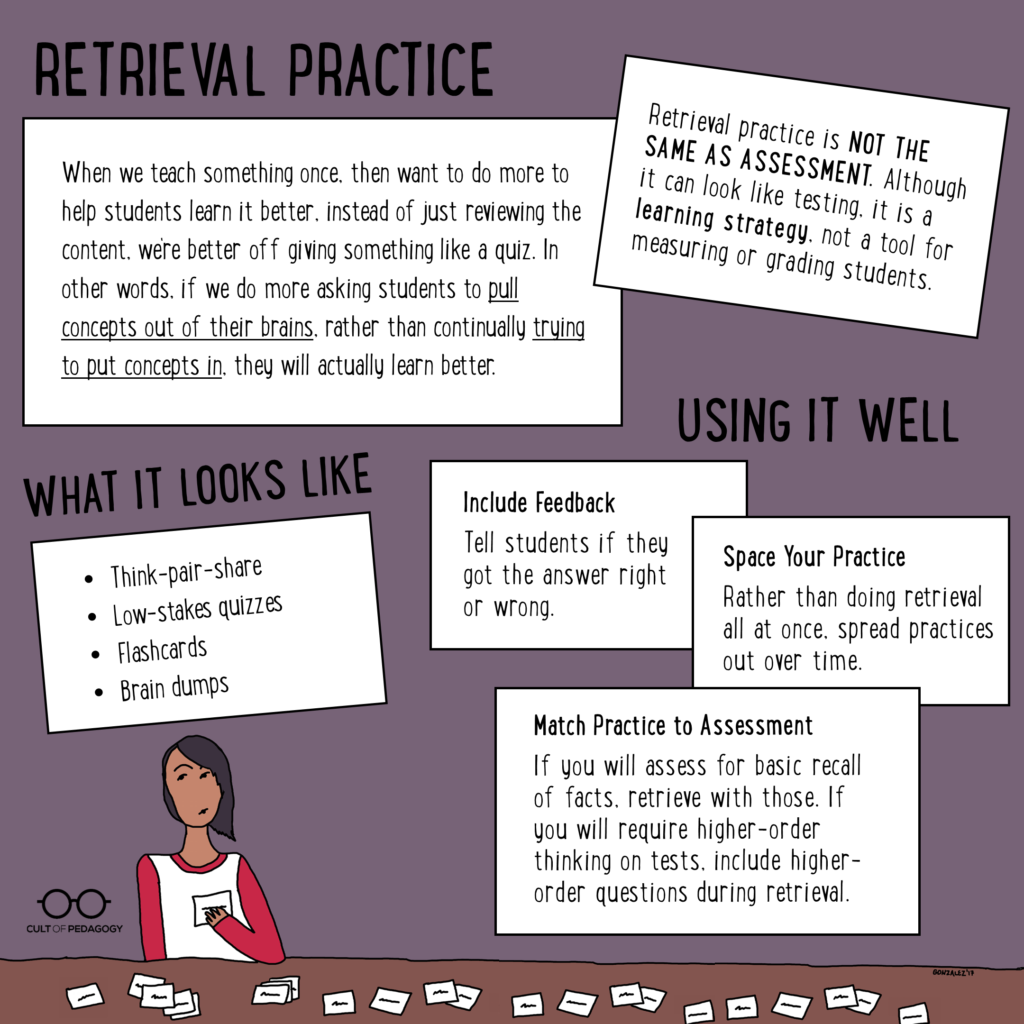
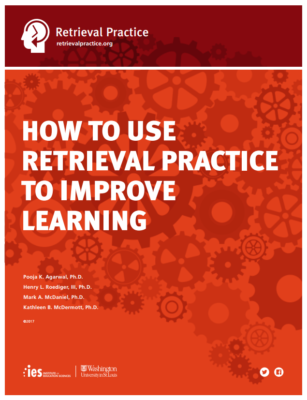
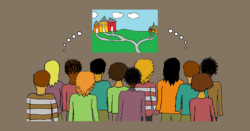
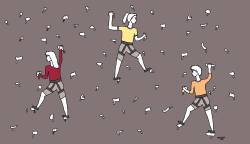

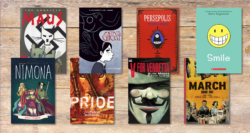
I have a wacky review game that I created based on a New Year’s Eve game I played as a kid, that works really well. And after reading your article, I see that the my 8th graders are using retrieval practice. It’s pretty much the only review game I use because it’s so effective to study for a social studies test.
I call it the three round game. There is a large bowl full of cards with key terms, people, etc. like one side of the flash card. Kids are out into three teams. Round 1 is kind of like the game Taboo: one player comes up and gives as many social studies clues as possible without saying the word and the card and tries to get their team to guess the word. The student does as many cards as possible in a minute. 1 point per card. If team doesn’t guess the card it goes back in the bowl. Next team goes, then the third, etc. round 1 ends when the bowl is empty- every card guessed correctly. Round 2- every card goes back in the bowl so the kids have seen them all. Now it’s charades and each card is worth 2 points. Same idea as round one: 1 minute per team but doing Charades. Round ends when the bowl is empty. Round 3-all cards back in, kids have seen them twice. Like the two previous rounds kids have to get their team to yell out the answer but this time the clue giver can only say one word. One social studies related word that will get their team to guess the word and each card is worth five points. This game is crazy loud and fun and they know their stuff after. And it’s all retrieval, I only give them the terms.
Hi Erin. Three rounds sounds amazing! I can imagine that just one of the rounds would be effective, but the combination of all three sounds incredibly valuable. I might even try this with my college students. Thanks for sharing!
Love this review game! This is going to be used! Thanks for sharing it!
I play the same game in my classroom but rounds two and three are switched. We call it 3 Stage Charade
Hello Erin! I work with grades K-3 and I love your strategy! I can envision this game being used across Math, science, ELA, and social situations (role-play), etc. contexts. I like the way in which students must connect and “label/identify” based on given (list) “clues.” Great activity for promoting associative thinking. Thanks for sharing!
Student made flashcards are worked into our Word Work Must Do for Guided reading. The create the deck with a partner and quiz each other on the words. They keep past and present decks in their folder.
After shared reading during their reflection time I ask them to simply define the concept we learned in one sentence. For example, “What is point of view? ” When they show me their journal I either star for effort or give a check for a correct response. Student can immediately retrieve and also get immediate feedback on their learning.
Definitely will be bringing this to teachers at my site!
Fantastic use of retrieval and feedback that’s low-stakes and engaging. The star for effort (wrong answers?) sounds like a great method for feedback. Thanks!
I play classroom bingo which incorporates retrieval. It takes a lot of work, so I don’t do it but a couple of times a year, but it can probably be adapted to your own needs.
I often play classroom bingo on a “fun” day like Halloween. I make up bingo cards based on words and phrases from the day’s lecture. (this is the part that is time intensive.) Students will mark the words when I discuss them. When they get bingo, then they call it out. I ask them to tell me about one of the words in their winning bingo line. Not only does it help the students retrieve the information from the lecture, but it also helps me catch misunderstanding early. Students can call out bingo for the entire class period, so there are multiple “winners.” Students also get a small prize when they call out bingo.
Hi Leigh,
I love this idea. I think you could lessen your workload if you flash the words up on the board, have the students copy them on a bingo board anyway they want. Then continue the game…. You are giving them a pre-view of the words, AND you don’t have to make bingo boards for them.
Try online sites that make the bingo cards for you. You supply the words. The site makes the cards–each one different. You print the cards.
https://myfreebingocards.com/
Bingo! Retrieval + feedback + multiple winners + low-stakes + formative assessment. Super. Thanks for sharing!
For creating a BINGO game, I would go straight to http://www.flippity.net/
Using a google spreadsheet you can create an infinite number of cards and instantly print different ones out.
BONUS: You will also have a link to let students have their own DIGITAL card (and refresh for a new one)
Here is one I have done for Times Tables
https://flippity.net/bi-pl.asp?k=12j2ZBXFspbuUus8R5txcqR7nWvtWIzIE-qBpysznKYE&r=f
Thank you for posting this article, Angela. I found Pooja’s web site two years ago while research Robert Bjork’s (UCLA) work on learning. What a gift!
Using start of the day “Do Now” one and two question “tests” (magic if the mini white board) of previously taught curriculum (especially math) and low stakes quizzes not only helps my kids learn (through retrieval practice and feedback), but provides me useful formative assessment data that helps shape my instruction.
Really good stuff. 👍
I’m flattered, Mark! Glad you found Bob Bjork’s website. I have a few of his presentations in a playlist on my new YouTube channel: youtube.com/retrievalpracticeorg. Enjoy!
You never cease to amaze me, Jennifer! I am always eager to listen/read to your podcasts. One clarifying question I had was, I know that retrieval practice is NOT the same as assessment, but would it be appropriate for teachers to use that information formatively?
Hi Jeanie, I’m a Customer Experience Manager with Cult of Pedagogy and a former teacher. Yep, there are times when retrieval practice lends itself well to informing instruction, especially if the practice indicates particular misconceptions. The main thing is to remember the practice is a learning activity and should have little to no impact on student grades. Hope this helps!
Hi Jeanie! Great question which we didn’t touch on. Retrieval practice can definitely serve as formative assessment for teachers. I like to emphasize that retrieval practice is foremost a learning strategy for students, with the added benefit of formative assessment. This way, we keep in mind the primary purpose – learning. I hope that helps.
I like the terms assessment of, for and as learning. Assessment of learning is summative. Assessment for learning is formative used by the teacher for next steps. Assessment as learning is metacognitive (and reflective) used by the student to understand themselves as a learner and to plan next steps. In this case, retrieval practice is both assessment for and as learning.
I love this article, plus all the tips and activity suggestions. Today in Spanish 3, pairs of students worked together to recall 20 facts/events from chapters 1-6 of a 10-chapter novel we are reading. They listed them in Spanish on a paper. It was a good review after a crazy homecoming week last week. Now they are prepared for today when we will read chapter 7.
¡Fantástico!
Great article. I apply this technique as a golf coach. By asking questions the athlete can achieve guided discovery but more importantly, the athlete/golfer is better prepared on the golf course during a tournament when chaos takes place. They are better prepared for problem solving.
Great adaptation, Randy! All of these strategies (retrieval, spacing, feedback, etc.) all apply in sports and motor learning. More research on applications to sports is described in Make it Stick (mentioned in the podcast and linked above). You may also be interested in a book entitled Choke by Sian Beilock. She’s a psychological scientist who looks at performance anxiety and choking under pressure (especially in sports). Thanks!
Thank you. These strategies can be applied with nursing students in the clinical settings to help them retrieve pathophysiology of patients disease processes.
Thank you again.
You are most welcome, Frankie. Thank you for listening and for sharing these research-based strategies with students in clinical settings.
Hi,
What a great post. Thanks for sharing all the resources as well. Quick question; Is it better to pair a picture with the word, or with the definition/information/fact side of a flashcard?
Research demonstrates that pairing pictures with words can enhance learning. I recommend learning more about “dual coding” from the Learning Scientists at learningscientists.org.
OK so I finally got on Pinterest (really!) and guess what the first article I read was? Thank you for this information, showing we really can go back to the basics when helping students memorize. I appreciate the research as well, and will check out Dr. Agarwal’s site. We found that flashcards weren’t working well for my homeschooled, hands-on kid in learning math facts—ironically. So we’ve switched to a sing-song cadence she does while we’re going to or from rehearsal or practice, 5 days a week. She goes through a number, multiplying it from 0 to 12 in order, 3 times. Then I ask her the facts, out of order. If she doesn’t get something right, I remind her of the answer and she says, for example, “6 x 7 is 42,” 3 times, in the same sing-song cadence. So far, we’re seeing a huge improvement in her recall! Of course I’m open to suggestions and love the ideas I’m seeing here. Thank you!
I love knowing how successful the strategy of interleaving is for you and your daughter! I have more information and a free guide for download at retrievalpractice.org/interleaving. Thank you for making the time to share.
Dear Jennifer and Pooja,
Though I have worked closely with over a 1000 student teachers and many teachers, some of them secondary, I have rarely been able to motivate them to do two variations on retrieval practice. I have been convinced ever since I was placed in private high school, for what one might call academic maturity, that the secret to my success there was the hovering pop quiz. In brief, I was scared not to study every night what was presented that day. I rehearsed in increments and my retrieval improved. Secondary teachers I worked with were skeptical of daily quizzing because, unlike the teachers at St Albans School, they had 25-30 students in a class. I countered that they had only to spot check the tests, rarely even grading them. {Different at my school admittedly}. Secondly, with a bit more success, I encouraged student debriefing at the end of class and at the beginning, either verbal in pairs or in writing. The motivation for students to do this could be bolstered by occasionally coming to individuals with specific praise concerning their debriefing.
The content of the debriefing or the spot quizzes could be straight recall, response as questions, or response at different levels of thought. The class could have a menu of response cues such as analogy, cause/effect, evaluation, contrast, further examples of an idea, or ideas from examples. This varied response can be achieved by a metacognitive typology such as the ThinkTrix.
I was stunned at the truth in what you are saying and glad to see it out there. though I am pleased to see Think Pair Share involved, what really caught my attention is the retrieval construct. I am impressed also with the idea that the debriefings do not have to be graded. Never though much of tying everything to grades. Properly designed, retrieval practice can take the place of some of the dreaded homework Hope to stay in touch. You are bringing parts of education to life. Frank Lyman
Thank you for your comment, Frank. You, your student teachers, and your students bring education to life!
I am looking forward to using this tool.
Let us know how it goes! Make sure to subscribe for our email updates at retrievalpractice.org for more tips, strategies, and resources.
Love love this article. I’m drawn to this as a former Psychology and history teacher turned Academic Dean at a start up school. In my new role, I get to build the calendar and schedule!!
I’m wondering if a spiraling, modular calendar makes sense to help accentuate deeper learning on the macro level. That type of schedule can be seen here:
https://www.madeira.org/academics/modular-schedule/
I’d love to discuss!
Think of spacing like mini-spiraling. By asking students what they remembered from a 1-7 days ago (or more), the interim forgetting is a good thing for learning. Spacing adds a mental struggle and desirable difficulty. Spiraling curriculum is on a much larger scale, over semesters and years. While tying in content to prior knowledge is important, spacing boosts long-term learning through frequent retrieval practice.
There is a growing movement in our high school — and others — to eliminate end-of-semester exams. I believe if we go that direction students’ long-term retention will suffer. I have not seen anything specific in the research that addresses end-of-semester exams as retrieval practice.
Two questions:
1. Do you think end-of-semester testing promotes long-term retention?
2. If you know of any retrieval practice research specific to end-of-semester exams or other “summative” testing, could you please refer it to me?
Thank you!
Keep in mind that with end-of-semester exams, you may be assessing how well students cram, not how well they will ultimately retain knowledge. As we discuss, cramming leads to short-term learning while frequent retrieval practice leads to long-term learning. Think about it this way: Rather than giving a midterm exam and a final exam, break them up into 4 smaller exams. This will encourage frequent retrieval and reduce cramming. I have more information about research on end-of-semester exams in a review of the literature my colleagues and I conducted, available at retrievalpractice.org/review.
The low-stakes quizzes have been an amazing addition to my classes this year!!
I use a Form everyday as an attendance tool and as a formative assessment. I pretest material, I posttest recent and previously taught material. The students know these test are not graded since they are formative assessments but they strive to get the points if the day. I usually have 3 questions, never more than 4 and the students know these questions will more than likely show up on the actual Unit Test. We review their answers as our opener Both the students and I love it!
Hi Jennifer,
I wanted to say a HUGE thank you for all the work you have put into this.
I teach in a school in one of the less affluent areas of England and the startegies are so simple to adapt for our students.
I thought I ‘got’ Retrieval Practice, but when I read this:
“if we do more asking students to pull concepts out of their brains, rather than continually trying to put concepts in, students will actually learn those concepts better”
It all of a sudden clicked into place. Lightbulb moment, thanks to your choice of language. Thank you!
Hi Jennifer,
So glad you’re enjoying and finding value in our resources! I’ll be sure to share this with Jenn!
Being someone that uses these myself. It never crossed my mind to use them for others. Though my students love kahoot, but for other reasons. Thanks for pointing out that things I didn’t realize I use on myself would work for them.
A professor referred me to your site.
I do a lot of work around disability and wanted to let you know that people are finding the black text on the red background hard to see – especially those who are color blind.
Hi Corrine, thanks so much for bringing this to our attention! I will be sure to pass this message along to Jenn directly.
Hi Corrine, thanks for pointing this out. I looked over this post and the only place I saw black text on red background is at the very top of the page—correct? I am going to take steps to fix this issue and create alternative images for color-blind readers, so I want to make sure I know where to look. I’m pretty sure I have a few other images within some posts that will need alternatives created, but I wanted to make sure I didn’t miss anything on this one! If you could confirm that would be great. Thanks!
I’m an adult at this point and kinda went through my WTF moment in life and reloaded I had to learn a lot more about people and how things work etc. And I’ve realized that inquiry questions based learning is amazing for me and my adhd, it’s like dopamine every time. And then it’s like I’m connecting everything in a bit of a hypervigilant state trying to figure out how it helps me meet my needs of autonomy (big one) and competence and relatedness, saftey and stimulation, and I do find that the symptom of the hyperactivity of “talking too much” is actually great for retrieval practice. You just have to really connect to the WHY and HOW this helps us meet our needs to grow and become more autonomous competent and how that leads to our relatedness. And before you know it, we are walking around , like normal talking “too much” but guess what we are talking about lol, it’s that retrieval practice.